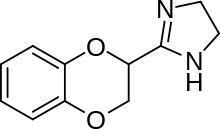Idazoxan
Idazoxan (INN) is a drug which is used in scientific research. It acts as both a selective α2 adrenergic receptor antagonist, and an antagonist for the imidazoline receptor.[1][2] Idazoxan has been under investigation as an antidepressant, but it did not reach the market as such. More recently, it is under investigation as an adjunctive treatment in schizophrenia. Due to its alpha-2 receptor antagonism it is capable of enhancing therapeutic effects of antipsychotics, possibly by enhancing dopamine neurotransmission in the prefrontal cortex of the brain, a brain area thought to be involved in the pathogenesis of schizophrenia.
 | |
| Clinical data | |
|---|---|
| Routes of administration | Oral |
| ATC code |
|
| Legal status | |
| Legal status |
|
| Identifiers | |
| |
| CAS Number | |
| PubChem CID | |
| ChemSpider | |
| UNII | |
| ChEMBL | |
| CompTox Dashboard (EPA) | |
| Chemical and physical data | |
| Formula | C11H12N2O2 |
| Molar mass | 204.229 g·mol−1 |
| 3D model (JSmol) | |
| Chirality | Racemic mixture |
| |
| |
| | |
Alzheimer's research
Mice treated with idazoxan, which blocks the α2A receptor which regulates norepinephrine, behaved similarly to control animals despite still having amyloid-beta plaques in the brain, as a proof-of-concept experiment that dramatically reduced Alzheimer's pathology and symptoms in two mouse models, potentially offering an immediate treatment for this devastating disease.[3]
See also
References
- Bousquet P, Bruban V, Schann S, Greney H, Ehrhardt JD, Dontenwill M, Feldman J (June 1999). "Participation of imidazoline receptors and alpha(2-)-adrenoceptors in the central hypotensive effects of imidazoline-like drugs". Annals of the New York Academy of Sciences. 881 (1): 272–8. Bibcode:1999NYASA.881..272B. doi:10.1111/j.1749-6632.1999.tb09369.x. PMID 10415925.
- Clarke RW, Harris J (2002). "RX 821002 as a tool for physiological investigation of alpha(2)-adrenoceptors". CNS Drug Reviews. 8 (2): 177–92. doi:10.1111/j.1527-3458.2002.tb00222.x. PMC 6741674. PMID 12177687.
- University of Alabama at Birmingham (January 15, 2020). "Pathogenic Alzheimer's disease cascade is activated by faulty norepinephrine signaling". medicalexpress.com. Retrieved January 15, 2020.